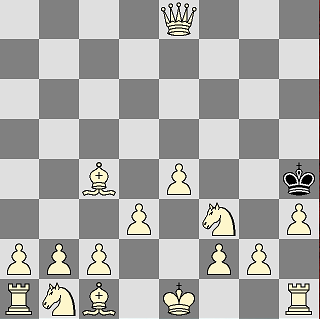(related to Problem: The Forsaken King)
In the original Dudeney's Book from the beginning of the 20th century, the following cases are given, in which the black King is mated in only 6 moves.
Play as follows:— White. Black. 1. P to K 4th 1. Any move 2. Q to Kt 4th 2. Any move except on KB file (a) 3. Q to Kt 7th 3. K moves to royal row 4. B to Kt 5th 4. Any move 5. Mate in two moves If 3. K other than to royal row 4. P to Q 4th 4. Any move 5. Mate in two moves (a) If 2. Any move on KB file 3. Q to Q 7th 3. K moves to royal row 4. P to Q Kt 3rd 4. Any move 5. Mate in two moves If 3. K other than to royal row 4. P to Q 4th 4. Any move 5. Mate in two moves Of course, by "royal row" is meant the row on which the king originally stands at the beginning of a game. Though, if Black plays badly, he may, in certain positions, be mated in fewer moves, the above provides for every variation he can possibly bring about.
Unfortunately, the solution is wrong. Modern Chess Engines prove that the shortest number of moves needed to mate the Black King starting from the original position is seven if Black tries to make it as hard for White as possible to win.
The solution (found by the Fritz Chess Engine) is:

This eBook is for the use of anyone anywhere in the United States and most other parts of the world at no cost and with almost no restrictions whatsoever. You may copy it, give it away or re-use it under the terms of the Project Gutenberg License included with this edition or online at http://www.gutenberg.org. If you are not located in the United States, you'll have to check the laws of the country where you are located before using this ebook.